Hello and welcome!
Of course, the work of the Synod is continuing, but last week, we also held our Plenary Meeting of the Pontifical Commission for the Protection of Minors.
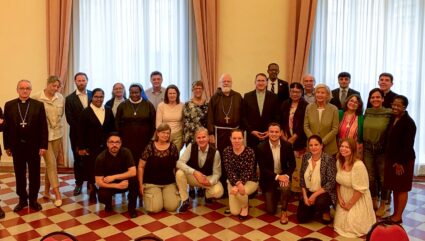
We heard reports from all over the world on safeguarding and also about the plans for our annual report that will be released in two weeks. The annual report will document the work of the commission, as well as report on the many meetings we have had with different bishops’ conferences from throughout the world as they made their ad limina visits, particularly regarding our conversations with them about safeguarding and child protection.
Last Thursday, which was the feast of Blessed Gerard, the founder of the Order of Malta, I attended a reception held at the Embassy of the Order of Malta in Rome.

The Order of Malta has such an important role in the Church because of all the social works they carry out, particularly in healthcare, hospitals and care for refugees, and there was a very interesting article in The Pillar recently about the history of the Order, its status as a sovereign entity and the unique role its diplomatic corps can play in humanitarian work throughout the world.
When I became Bishop in the Virgin Islands, one of the reasons I included a Malta Cross in my coat of arms is because St. Croix once was a territory that belonged to the French Knights of Malta. In fact, the original name given the island by Christopher Columbus was Santa Cruz, but when the Knights of Malta came, they officially changed it to St. Croix, and that was their headquarters in the Caribbean for a time.
Father Jordi Pujol, a priest of Opus Dei who works with the protection commission on communications, accompanied me to the reception.
On the way, we stopped at his residence. I was very impressed with their chapel.
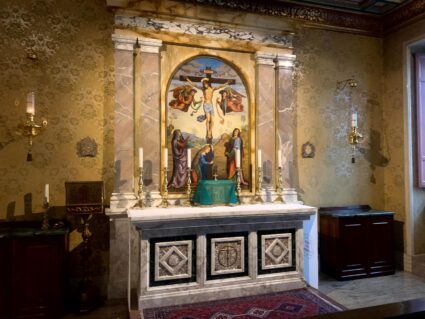
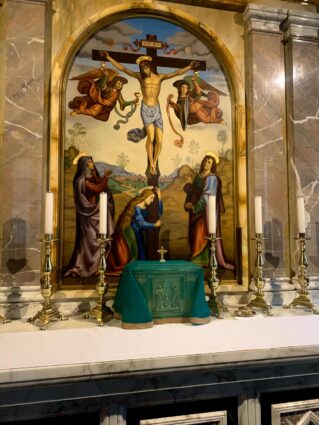
Last Friday, the synod participants gathered for an ecumenical prayer vigil in the Square of the Roman Protomartyrs, the spot where St. Peter was martyred. The square is in between the old sacristy and the basilica itself.
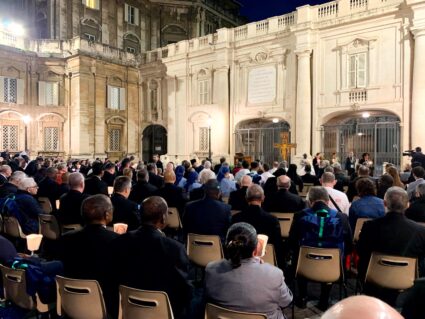
It was a beautiful evening to have an outdoor event.
A number of the fraternal delegates of the different churches had prominent roles in the celebration. They also had a very beautiful choir and musicians accompanying them.
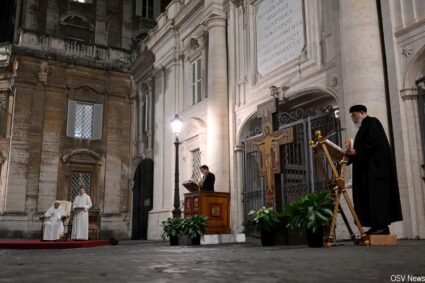
It was also the feast of St. John XXIII and the anniversary of the Second Vatican Council, which, of course, gave such an impetus to the ecumenical movement. The reading from the Office of Readings for the day presents the words of Pope John on the ecumenical movement as the council was beginning.
From the addresses of Saint John XXIII, pope
(At the solemn inauguration of the Second Vatican Ecumenical Council, October 11, 1962)The Church is the most loving mother of all
Mother Church rejoices that, by a singular gift of Divine Providence, the most longed-for day has now dawned when, under the patronage of the Virgin Mother of God, whose maternal dignity is commemorated on this feast, the Second Vatican Ecumenical Council solemnly begins here at the tomb of blessed Peter.
Truly, the very serious issues and questions that the human race needs to resolve have not changed after almost twenty centuries. Indeed, Christ Jesus always holds the central place in history and life. People either adhere to him and his Church, and so enjoy the goods of light, sweetness, right order and peace; or else they live without him or act against him and deliberately remain outside the Church. And so they cause confusion among themselves, bitterness in human relationships, and the imminent danger of bloody wars.
At the inauguration of the Second Vatican Ecumenical Council, it is evident, as always, that the truth of the Lord will remain for ever. Indeed, as one age gives way to another, we see that uncertain human opinions take over one from another; and often errors vanish as soon as they are born, like mist dispersed by the sun.
The Church has never failed to oppose these errors, and has even condemned them often, indeed with the greatest severity. But at the present time the Spouse of Christ is pleased to apply the medicine of mercy, rather than take up the weapons of severity. She judges it prudent to meet the needs of today by demonstrating more amply the power of her teaching, rather than by condemning. It is not that there is any lack of false doctrines, opinions, and dangers to be guarded against and eliminated; but these are all so openly in conflict with the right principles of honesty and have produced such deadly fruits, that today people seem to have begun to condemn them on their own account, even by naming those ways of living which despise God and his laws or place too much confidence in technological progress and a well-being based solely on the comforts of life. They understand more and more the dignity of the human person and that the need to perfect it is a matter of great importance and very difficult to accomplish. And what is most important, they have at last learned by experience that force exerted on others, the power of arms and political domination are of no use at all in finding a happy resolution to the grave issues which afflict them.
In these circumstances, the Catholic Church, as she raises the torch of religious truth through this Ecumenical Council, wishes to show herself a most loving mother of all, benign, patient, and moved with mercy and goodness towards the children separated from her. To the human race, laboring under so many difficulties, she says, as Peter once said to the poor man who had asked him for alms, I do not have silver and gold, but what I have I give you: in the name of Jesus Christ the Nazorean, arise and walk. That is to say, the Church does not offer to the people of our time riches that perish, nor does she promise them mere earthly happiness, but she imparts the goods of heavenly grace, which, since they raise people to the dignity of the children of God, are powerful safeguards and aids to making their life more human. She opens the springs of her life-giving doctrine, by which people, illumined by the light of Christ, can understand in the depths of their heart what they really are, how excellent is the dignity they possess, and what end they should pursue. Finally, through her children, she extends everywhere the bounds of Christian charity: nothing is more suited to eliminating the seeds of discord, nothing is more effective in promoting harmony, a just peace, and the fraternal unity of all.
Last Saturday, I joined a rosary procession in St. Peter’s Square.
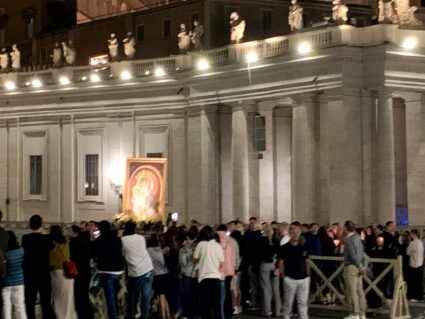
As I have mentioned before, the new archpriest of the basilica has been organizing many activities at night at St. Peter’s, which I applaud because during the day, the basilica is so crowded with tourists. But at night, these rosaries, holy hours, stations of the cross and other activities are an opportunity for people to come to St. Peter’s to have a prayer experience.
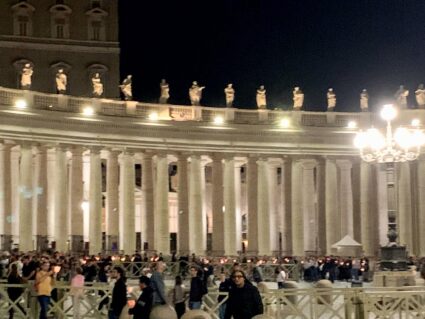
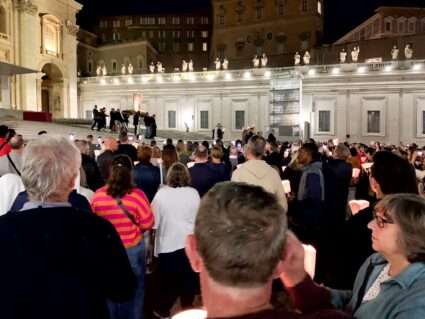
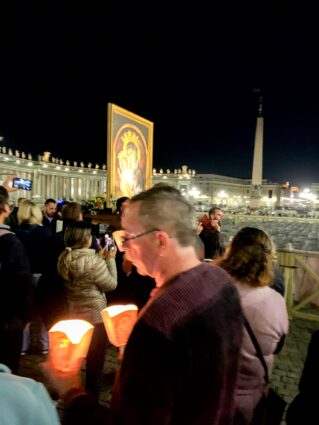
As part of this, every Saturday during October there is a rosary procession with reflections on the mysteries. Thousands of people come to participate in it, and it’s always a wonderful event.
Anthony Russo, the associate dean at the Clough School of Theology and Ministry at Boston College, is leading a group of students for an experience here in Rome around the Synod. This group is part of a larger delegation called CENTERS (Catholic Education Network to Engage Rome and Synodality), which includes fifteen Catholic colleges and universities from across the U.S., and their goal is to help advance the Church’s mission of synodality in the U.S.
So, on Tuesday, Dean Russo invited all the American participants in the Synod to join the students, campus ministers, and faculty for a dinner. It was a delightful evening, sponsored by Eustace Wolfington, whom many of you might remember as the Executive Producer of the Cabrini film.
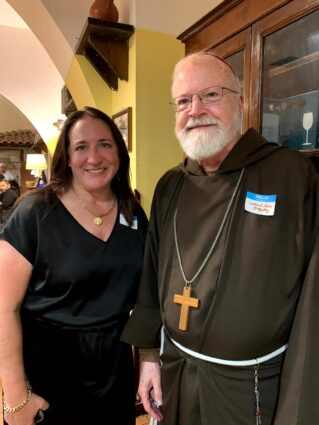
It was very uplifting to meet these young people and educators who are dedicated to promoting synodality in our Church.
A very important element of the Synod is prayer together. So, yesterday we had a Mass in Spanish in St. Peter’s Basilica at the Altar of the Chair celebrated by the Cardinal Archbishop of Mexico City, Carlos Aguiar Retes.
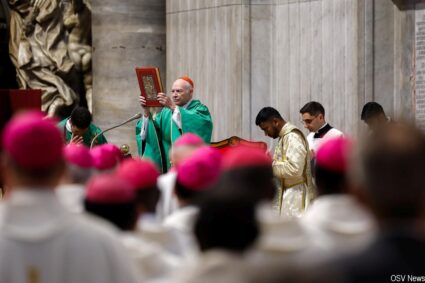
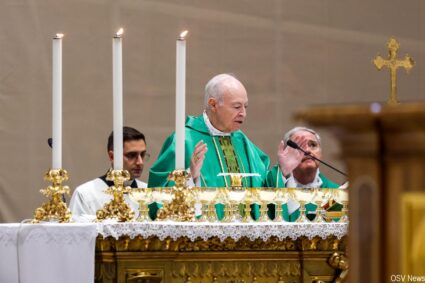
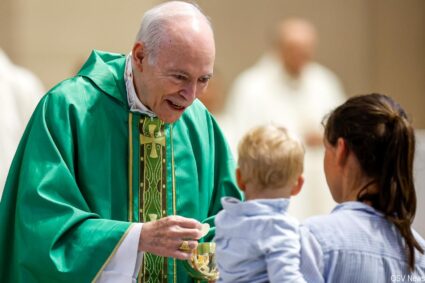
In his homily, he spoke about the “selfish disorder” that affects humanity and how we can overcome it by allowing the Holy Spirit to guide us. One of the key points he made was about fraternal correction, and that it isn’t about judging others but about guiding them with kindness and humility.
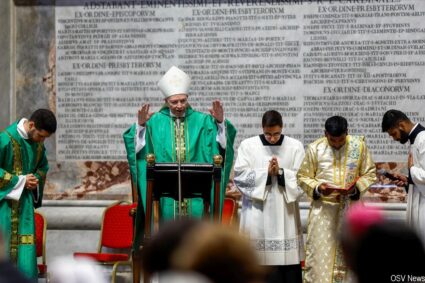
He also talked about the importance of trusting in the help of the Holy Spirit to face challenges both within and outside the Church, which is so important for us in our work at the Synod.
During our Synod activities I was very happy to run into Margaret Karram, the President of the Focolare Movement.
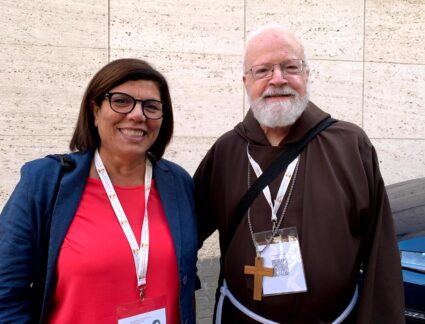
It was wonderful to see her.
Finally, this week, I was very happy to see the progress made by Cardinal Matteo Zuppi on his visit to Moscow as part of the peace mission entrusted to him by Pope Francis. This visit, like his trip last year, focused very much on promoting the reunification of Ukrainian families and the exchange of prisoners.
I was particularly encouraged by the progress he made in addressing the plight of Ukrainian children forcibly taken to Russia. Thanks to Cardinal Zuppi’s efforts, a number of these children are able to return home, bringing hope and relief to their families.
The Holy Father is anxious to try to promote peace in the world. And, certainly, in the Synod, much of our attention is focused on the world situation that is so troubled and complex, such as we are now experiencing in Gaza, Lebanon and Ukraine. The important progress made by Cardinal Zuppi is a great sign that we must always continue to work and pray for peace.
Until next week,
Cardinal Seán
